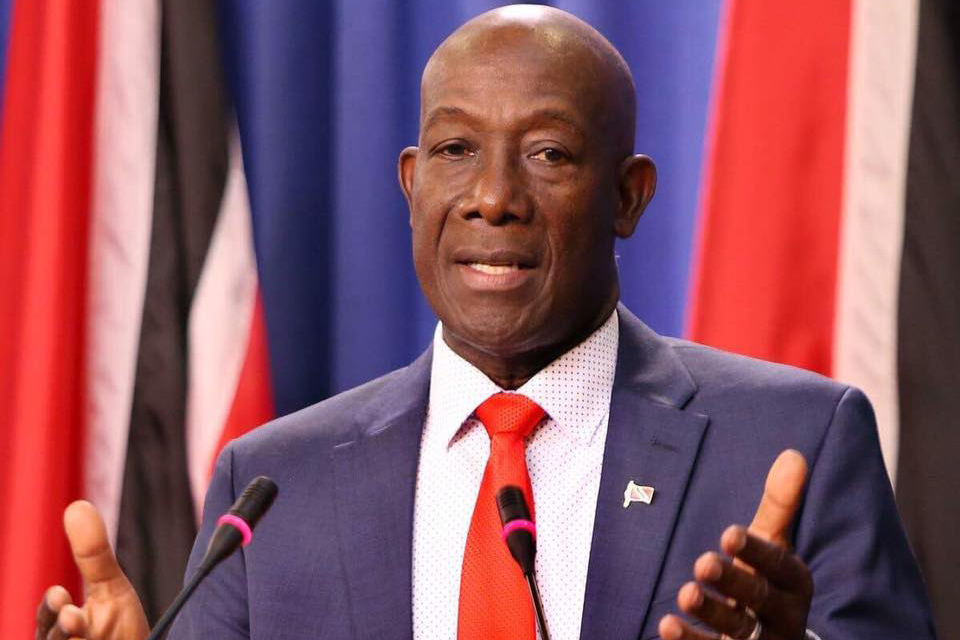(Trinidad Guardian) Prime Minister Dr Keith Rowley will leave tomorrow for the United States (US) where he will undergo a series of coronary tests and observation. He will be attended to at a health institution in California.
His medical leave of absence will be indefinite, as it would determine whether he would have to undergo any immediate procedures to treat and deal with the issue.
This was disclosed by Rowley during a media conference at the Diplomatic Centre in St Ann’s. Some of his cabinet members present included Finance Minister Colm Imbert, Attorney General Faris Al-Rawi and Minister of National Security Stuart Young.
Rowley said that in 2016, amidst several tests for prostate cancer, he subjected himself to a coronary test that revealed a “soft plaque” in one of the arteries.
“It was available. It turned out then that they did see a small…some soft plaque developing in one artery and they didn’t think that it required any unusual response other than to observe it,” Rowley said.
Rowley, 69, indicated that a second test done in 2017 revealed that it appeared much bigger. He said when he was initially tested he changed his diet and lifestyle a bit. However, the issue progressed and it is at a stage now where it needs further medical attention.
Admitting that he was very delinquent in treating with the coronary issue for over a year, the PM said he has now decided to place it on his priority list.
“I would leave and join my doctors and family in California and I’ll go through whatever processes and procedures are required,” Rowley said.
Giving reason for the delay in furthering medical checks, Rowley explained that he had other priorities, such as a Caricom meeting with the United Nations over the ongoing and deepening Venezuelan crisis.
On February 18 Rowley said he went to his local doctor and during an examination was told he had to immediately treat with the heart issue.
But he said he again pushed it back because he had to attend Caricom’s 30th Inter-sessional Meeting of the Conference of Heads of Government later that same month (February).
He said there would have been a further delay following a request to attend a meeting with the US Secretary of State Mike Pompeo at the Whitehouse in Washington, DC, which was carded for tomorrow, however, it was subsequently cancelled for reasons which Rowley chose not to disclose.
Rowley and the Caricom delegation headed by St Kitts’ Prime Minister Dr Timothy Harris had been invited to a meeting on Ash Wednesday. However, the prime minister said that on Friday night he received a message about the cancellation of the meeting.
When asked if he the cancellation stemmed from statements he made during a media briefing on Thursday when he maintained Caricom’s stance, Rowley replied:
“I have been making comments about Venezuela for the longest while…I speak globally ever since we have been dealing with Venezuelans in T&T becoming a problem,” Rowley said.
“We have been careful not to do is to intervene in their politics so that there is nothing that I said that at that press conference or that Caricom would have said which would have dramatically change anything. What we did do is to reserve our right to speak as independent nations respectfully and factually and we do know that our points of view differ from other people but that is not a crime, it is a point of view that is different…we started out with that,” he added.
On Thursday Rowley said Caricom nations are maintaining their stance of non-interference in the Venezuelan crisis.
Rowley summarised the crisis in Venezuela, including the sanctions imposed by the United States and said the position of the US was “belligerent”.
Pompeo and US Vice President Mike Pence, have been some of the strongest voices advocating for a change in the Government of Venezuela. The US has even endorsed incumbent Nicolas Maduro’s challenger, Juan Guaido, as the rightful president of the country in the interim, until fresh elections are called.

